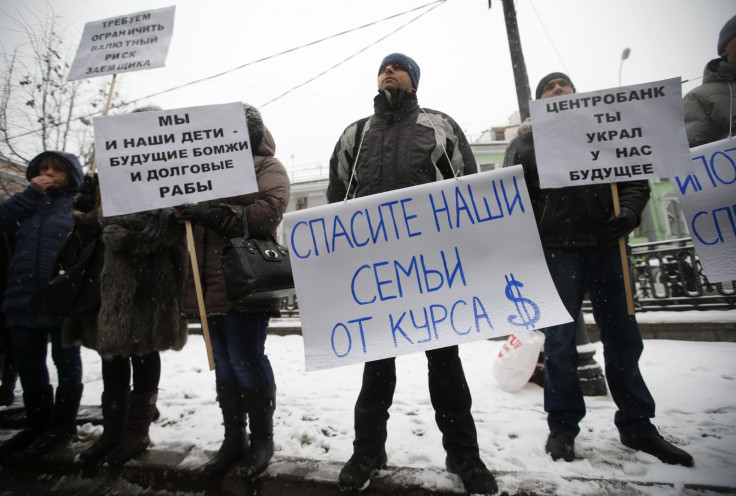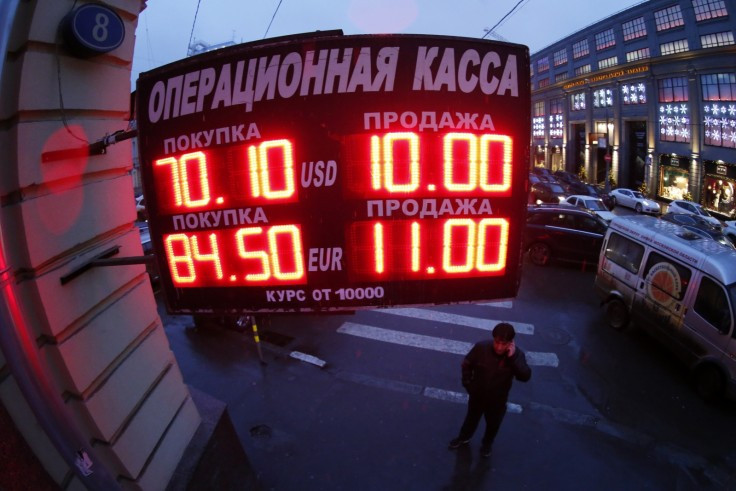Russian ruble: In Moscow we're losing hope as retailers revert to 'wild 90s'

I was waiting for Putin's press conference on the edge of my seat, just like a lot of people here. Unlike the summer, it was not the Ukrainian crisis that grasped the attention – after months of press hysteria, Ukraine is turning into a dull media Frankenstein that's too boring to follow for the Russian people.
What really makes people nervous is the future of the national currency. When your salaries and savings are mostly in rubles, it's a bit difficult to keep thinking about a war in another state when your wallet's leaking. In just a few weeks the ruble plunged against the foreign currencies, causing a severe price increase for almost every good and leaving many Russian household budgets severely damaged.
The country's importing a lot, from food and clothes to cars and computers. Now with the euro and dollar growing expensive, the prices for imported goods are going up, making people spend more to sustain the same level of comfort they have become used to over the years, and not everybody can keep up.
Putin told the press conference that pensions are going to be increased to cover the actual inflation. However, he gently avoided mentioning salaries, which might leave working people face-to-face with the new reality.
This reality is tough: three months ago one euro equaled 47,7 rubles – now the official central bank rate is fluctuating at around 80 per euro. In an attempt to hold the fall, the regulator has rolled out counter-measures like increasing the key interest rate from 10.5% to the stunning 17%. But this measure, which was right and justified in itself, has come to look like an impulsive decision, which should have been accompanied by other moves like binding the state corporations to sell their dollars and euros.
Instead of soothing the panic, the central bank has made traders believe the regulator itself doesn't have a plan.
The anxiety in the stocks immediately communicated to the public. Frightened by the euro/dollar skyrocketing of recent days, Russians rushed to the exchanges to buy foreign currencies in commercial banks, despite the crippling interest and the obscene buy-and-sell margins. On the evening of 17 December, an operator of a Moscow exchange office said they had to review the rate five or six times during the day, and were eventually selling at 100 per euro.

Society still unsure
After a turbulent Tuesday, and a Wednesday standstill, Putin's press conference was supposed to bring some clarity to the mess. Actually, even before Putin spoke, the ruble improved impressively, assisted by the positive expectations and a stable Brent oil price. By the end of the day the dollar had fallen eight rubles and the euro lost 11 rubles, according to the Central Bank's official rates.
In society, the mood is still unsure. There have been reports of people selling euros and dollars, saying they are going to put their trust in the ruble. Others still take a tongue-in-cheek view of the national currency. It looks like it's still going to take some time for the people to get used to the new reality and decide on their financial strategies, but anyway everyone's looking for stability.
Meanwhile, some retailers are getting back to practices which seemed to have been left behind in the 'wild 90s', as these times are widely known in Russia - pricing in 'conventional units', or 'c.u.' That's the euphemism which was used for the dollar some twenty years ago when the country's economy was crippled and ruble was useless. It seems it's finding its way back again, now hiding both dollar and euro behind its name.
Anyway, whatever the future holds, the Russian people have little hope for a better tomorrow. And while the volatile ruble is finding its place at an unwanted low, we're doomed to keep hanging on the edge of our seats thinking how sometimes what's hard to get is easy to lose.
© Copyright IBTimes 2025. All rights reserved.






















